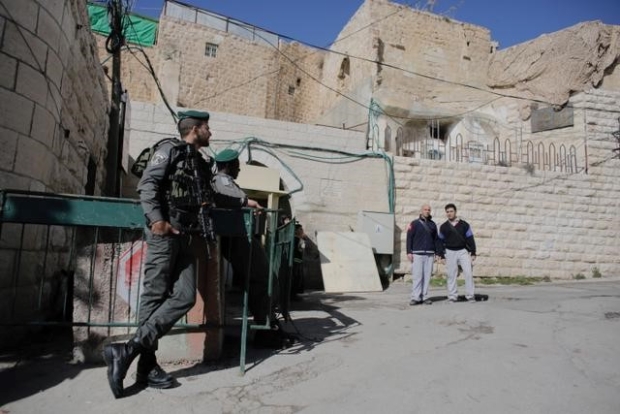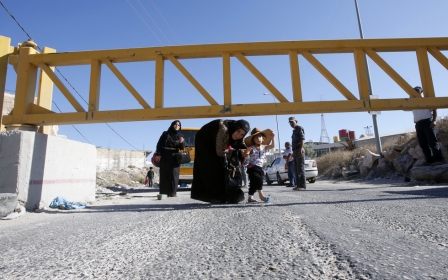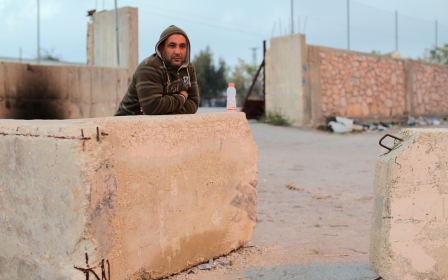'In a moment the mood can change': Observers keep watch as Hebron simmers

HEBRON, Occupied West Bank - The lone Israeli soldier sits stooped, machine gun in hand, against the shuttered storefronts of Hebron’s al-Shuhada Street.
A Palestinian girl skips by, spade in hand. Some moment later, a Jewish settler woman turns a corner pushing a baby stroller.
Suddenly, there is a commotion. A young Palestinian man is restrained by three Israeli soldiers on the main checkpoint in al-Sahla Street, which leads up to the Ibrahimi Mosque.
Children appear and watch from afar. He is told to put his hands against the wall and swiftly patted down.
A patrol of the Temporary International Presence in Hebron (TIPH) happens to be on site and is taking pictures as the incident unfolds. Most violent altercations between Palestinians and the Israeli army take place at checkpoints such as this.
Usually stones or bottles are thrown, but today the chronology of events is unclear.
Observer Ahmet Tutal, distinguished by a TIPH armband and the organisation’s grey and blue uniform, snaps pictures as the Palestinian man is told to kneel but Tutal knows he cannot intervene, only document.
A tense three minutes pass before the young man is eventually released.
"The camera is a very important tool that we have because if we document with images, it's unhampered in a way,” explained Rebecca Bengtsson, press officer at TIPH, a civilian observer mission set up by Israel and the Palestinian Authority in the 1990s to try and create security in the often volatile city.
For observers most days are eerily quiet. But in a moment the mood can change in a city that has become a focal point for confrontations between Palestinian residents, Israeli security forces and Jewish settlers.
Middle East Eye spent an afternoon with a TIPH patrol to witness at firsthand how their presence is helping to quell violence in the notoriously contested city.
Established in 1994 by six nations - Norway, Sweden, Italy, Turkey, Denmark and Switzerland - TIPH’s mission is to observe and report violent incidents perpetrated mostly against Palestinians residents in Hebron. It took on a new significance last autumn after the shooting deaths of several Palestinians were captured on camera and circulated by the media.
Prominent among them were the deaths of Ramzi Aziz al-Qasrawi and Abed al-Fattah Yusri, who was shot in the head while clearly incapacitated on the ground. The incident prompted international outrage and led to the arrest of an Israeli soldier, although his trial has done littel to quell tensions.
Violent incidents in Hebron are a regular occurrence. Observers are concentrated in six to 10 patrols around areas in the Israeli-controlled part of the town, where approximately 40,000 Palestinians live in close proximity to settlers. They work seven days a week for three months straight.
“If we are present, people behave differently just as if you are watched you behave differently,” explained TIPH observer Marie Anell during a patrol.
TIPH was initially created following the 1994 massacre in the Ibrahimi Mosque when settler Baruch Goldstein entered the holy site shared between Muslims and Jews, and killed 29 worshippers.
According to the mission’s mandate, observers record violations of agreements between the Palestinian Authority and Israel on Hebron as well as breaches of international human rights law.
They produce monthly and periodic confidential reports that are shared with Palestinian and Israeli officials, and sent to the embassies of TIPH member nations.
In practice, TIPH’s mandate also provides a sense of security for Palestinians in Hebron, which has led to criticism that its mission is one-sided by favouring one party in the conflict over another. Like the Palestinians they seek to protect, TIPH patrollers often face harassment from settlers.
“It’s very rare that we are able to observe it first hand,” she adds. "We have to be proactive and ask questions immediately, because we never know the names of the ISF [Israeli Security Forces] or who they are. If we don't ask immediately we may not find out. It's important for us that everything gets logged."
During especially violent altercations, observers request additional support from duty officers, who coordinate from TIPH’s headquarters in H2, the Palestinian-controlled portion of Hebron.
TIPH’s 67 observers made sure they were more present in hotspot areas during the surge in violence last autumn. Bengtsson says incidents were recorded on a near daily basis between October and February of this year.
"It's not chaos every day,” she clarifies, walking by two stone blocks where Hebron’s bustling vegetable market once stood. Observers also document the expansion of existing settlements, including details as tiny as a new bench or tree, or as significant as new checkpoints impeding the free movement of civilians.
“The land is occupied and, according to international humanitarian law, you are not allowed to transfer your civilian population to occupied territories,” Bengtesson says, pointing to a small park, developed just a year and a half ago by the settler community.
Rafik Lassel Sundstrom, a former observer, recalls how the first few days in the field came as a shock. “There’s a lot to take in, but after a while there’s a normalisation that goes on. You find a way to deal with it.
“You do a lot of interviews with families and it tends to be about the same topics, so when you’ve done 50 to 80 interviews about the same five or six things it becomes normal in a way. But you know it’s not really normal.”
There are moments on the job that Sundstrom still recalls vividly “especially when children are involved or being held, that visceral image sticks in your mind. In the fall and winter we had a lot of shootings and those images, when you see someone dying on the street, stay with you.”
Some have criticised the confidential nature of TIPH’s work but, as Bengtsson explains, much of the content of their reports has already been reported in the media.
Whether its work has been successful in instilling Palestinians with a sense of security is another matter, and much more difficult to measure.
In Hebron’s old souk, where overhead meshes protect Palestinian shopkeepers from settler harassment, observers are greeted as a local authority of sorts.
'I'm glad they are here'
Leyla, a local shopkeeper, runs up to Sundstrom to complain of a Palestinian man who threatened her for money. He listens and calls a TIPH patrol to follow up, knowing fully well that Palestinian-on-Palestinian violence is not in the purview of TIPH’s mandate. “Not all people have a clear view of … what we can do,” he says.
TIPH is not a police force, but for Hani Jaber, who lives in the old city, their presence is enough. When the Israeli Army arrested him and two of his friends, he called TIPH. Observers arrived within the hour and negotiated their release.
Jamal Maraga has been a shopkeeper in the area for 48 years. He claims TIPH’s presence has drastically changed the situation.
"In the old days, people didn’t know what was happening in Hebron, and when the Israelis above us know they are being watched they don’t do a lot of bad things."
Maraga has called TIPH to complain of settlers throwing rubbish, rotten eggs, bleach and even urine onto his shop from above.
"Things have gotten a lot better since they arrived," he says. "I am glad they are here."
But Anell says it is important to remains realistic about the extent to which TIPH can actually alter circumstances on the ground.
“It doesn’t stop the occupation,” she says. “Ultimately, it’s up to the politicians in our countries to make a difference.”
Middle East Eye propose une couverture et une analyse indépendantes et incomparables du Moyen-Orient, de l’Afrique du Nord et d’autres régions du monde. Pour en savoir plus sur la reprise de ce contenu et les frais qui s’appliquent, veuillez remplir ce formulaire [en anglais]. Pour en savoir plus sur MEE, cliquez ici [en anglais].





